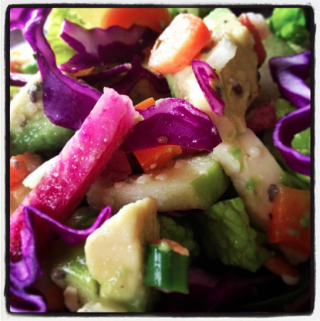Diet
Diet, Depression, and the Microbiome
The influence of diet on depression may be via the gut bacteria
Posted January 27, 2015

Over the past ten years or so the research on how diet might influence resiliency to clinical depression has come a long way. The consensus of the data so far seems to be that consuming whole, traditional foods is protective compared to a so-called Western Diet with lots of highly refined and processed ingredients. This correlation between mental health and a traditional diet holds in many disparate cultures and parts of the world, such as Japan, Australia, and Italy (1). While whole foods contain lots of vitamins, essential fats, and minerals in forms that we are evolved to process for maximum brain health, many people on a Western Diet get plenty of vitamins and minerals, but there is still a difference in health between those consuming whole foods and more processed foods.
While there are a few key nutrients such as B12, omega3 fatty acids, folate, B6 (particularly in the elderly), magnesium, and zinc that have depression and/or anxiety and other mental health and neurologic problems related to extreme deficiency, most studies looking for strong correlations between typical population deficiencies and depression have come up with nothing. So how, exactly, does a typical diet possibly protect someone from a clinical depression, or how would a Western Diet add to other environmental and psychological stressors to make one more vulnerable to depression?
I would say the foremost researcher on diet and depression in the world right now is Felice Jacka in Australia. She is part of an ongoing study looking at a modified Mediterranean diet in a randomized trial for the treatment of depression (2). Last year she published a terrific article for Current Opinion in Psychiatry that makes a good stab at understanding how diet influences depression in ways besides just the nutrients, explaining why whole, traditional foods are superior to highly refined diets. The answer, it seems, may lie in how whole foods and refined foods differ in the reaction of the gut microbiota.
Previous articles on the gut microbiota and depression can be found here:
The Gut-Brain Connection, Mental Illness, and Disease
Human Microbiota and Depression
In short, the gut microbiome influences the immune system and inflammation in a profound way. The fastest way to change the microbiome is to change the diet…the beasties in your large intestine adapt very quickly to changes in the diet. It seems that some pathologic species that cause inflammation may thrive with an unhealthy diet, leading to all sorts of so-called Western diseases such as obesity, high blood pressure, autoimmune disease, and even depression. By smart modification of the diet to more whole foods and away from highly refined, sugary, fried, Western diets, you can modify the gut bacteria and lower the risk of developing a clinical depression when you are exposed to psychological stress.
We already know that the composition of the gut microbiome can alter behavior in mice, and that treatment with particular probiotics can also improve anxiety behaviors (mostly in rodents, but there are limited findings in humans as well). Treatment with antibiotics along with antidepressants has been shown to improve psychotic depression in a small Japanese study (very interesting, because antidepressants alone are not recommended for psychotic depression…standard of care is to combine them with antipsychotics) (3). Stress, particularly stress in early life, is also known to cause problematic changes in the microbiota. A sicker microbiota (meaning in general less diversity and species and more pathologic species) is associated with a “leaky gut” wherein more inflammatory particles and bacterial cell parts pass through the gut lining, leading to systemic inflammation and problems, fatigue, and depressive behavior (avoidance, lack of energy and motivation).
Traditional diets tend to have more fiber and vegetable matter than the Western diet, which tends to have more highly refined carbohydrates. These fibers feed the microbiota in a healthy way, whereas lots of sugar and/or low carbohydrate Western diets have been associated with more pathogenic species of bacteria in the microbiome (4). In general a KFC Double Down Dog will not be a good choice for a healthy microbiome.
Our understanding of the microbiome is limited at this point. Different populations have evolved different micro biomes to support different diets and lifestyles…the robust microbiome of the Hazda may not be the healthiest microbiome for a computer programmer living in Michigan. We need to learn a lot more about the different types of microbiota and particularly how they interact or provide similar functions across different phyla before we really know what we are doing. In general, though, one can manipulate the gut via a healthy, whole-foods based diet.
Probiotics and prebiotics (certain fibers that feed the microbiota) can also transiently lead to a healthier gut, though some people get worse with prebiotics if they have certain populations of unhealthy gut bacteria that may bloom in response to prebiotic feeding. In these folks, restricting prebiotics entirely (i.e. a low FODMAP diet) for a short period, then reintroducing prebiotics and probiotics along with a healthy whole foods diet may be a way to reestablish a healthy gut microbiome and better physical and mental health in general.
Other mechanisms, such as fecal microbial transplants, currently in use for devastating bowel infections and experimental for irritable bowel syndrome might also (theoretically) be used in depression and anxiety in the future. All in all it makes for a rich and fascinating field for future study beyond the psychopharmacological and therapy we already use to treat depression.
Copyright Emily Deans MD




